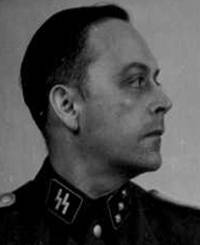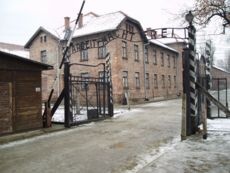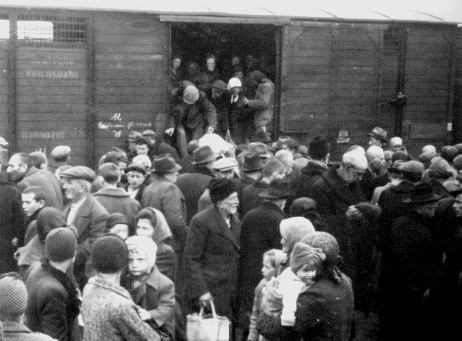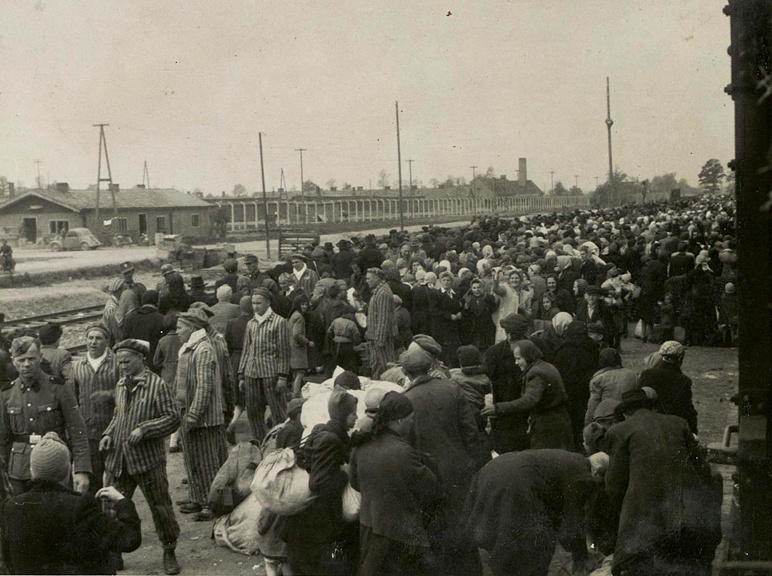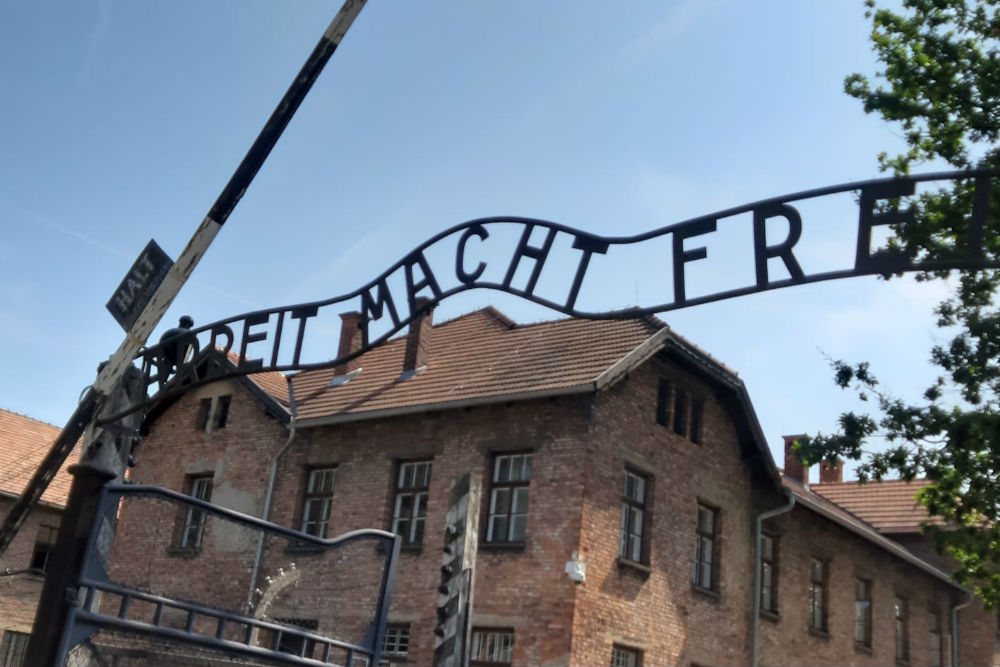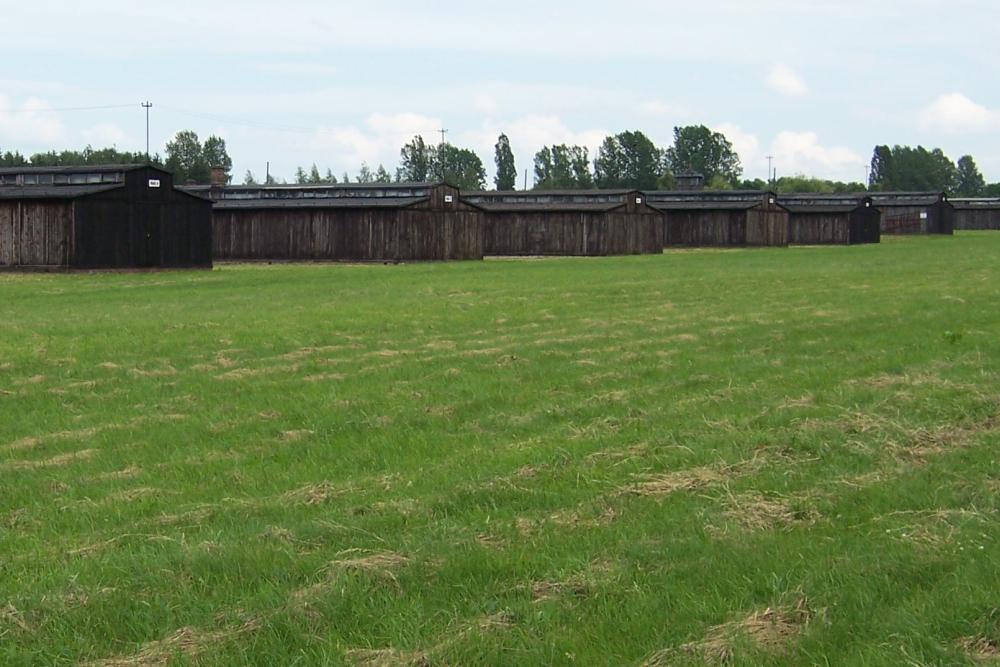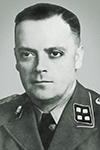Introduction
There are some among the camp commanders whose names are familiar to many such as Rudolph Höss and Joseph Kramer. A commander who has drawn less attention was Arthur Liebehenschel. Initially he made an inconspicuous career in the SS as a typical bureaucrat and he played an important role in setting up and expanding the system of concentration camps. More or less against his will he was appointed commander of Auschwitz I (Stammlager or main camp) in November 1943. Subsequently he had the questionable honor of being the last commander of Majdanek. According to witnesses, life as a camp commander was difficult for him. He did not have the ruthless, cold reputation of his predecessor in Auschwitz, Rudolph Höss. Nonetheless, Arthur Liebehenschel would end up on the gallows in Krakow.
Images
His early years.
Arthur Liebehenschel was born November 25, 1901 in Posen, now Poznan in Poland but at the time a city in the German Empire. He was too young to serve in World War One and during that period he completed a study in economics and civil administration. At the end of World War One he was active in a Freikorps and in 1919 he joined the newly established Reichswehr, leaving in the rank of sergeant-major in 1931 after 12 years of service.
In February 1932, Liebehenschel joined the N.S.D.A.P. (member number 932766) and almost three years later, November 9, 1934 he joined the SS (member number 39254). June 15, 1934 he rose from SS-Sturmführer to SS-Oberführer. Shortly after, on August 4, he was given an executive function in a concentration camp for the first time: he was appointed adjutant in concentration camp Columbia House in Berlin, close to Tempelhof airport. As early as 1933, this camp contained victims of the political persecution by the Nazis. It was notorious for the torturing that took place there. Since 1935, Columbia House was under direct supervision of the Gestapo but it was closed down as early as 1935 as meanwhile more and larger camps were established or under construction like Oranienburg and Sachsenhausen in the vicinity of Berlin. Meanwhile, Liebehenschel was employed as adjutant in concentration camp Lichtenburg near Torgau on the river Elbe but due to sickness – he was a cardiac patient – he did not remain there for long either.
In 1936, Liebehenschel was transferred to the Inspektorat der Konzentrationslager (Inspectorate of the concentration camps) near Berlin, headed by Theodor Eicke, the former commander of concentration camp Dachau. Liebehenschel went to work in the department that would later be known as Amtsgruppe D 1. In 1940, in the meantime promoted to SS-Sturmbannführer, he was appointed chief of staff and deputy of the Inspektor der Konzentrationslager (Inspector), SS-Brigadeführer Richard Glücks, the successor of Theodor Eicke who was appointed front commander of the SS-Totenkopf-Standarte. At the time, Liebehenschel issued an order stipulating that when a Kriegverdienstkreuz was bestowed upon a member of the SS for his participation in executions, under no circumstance the word ‘execution’ should be mentioned but instead the phrase ‘for having fulfilled tasks, important to the waging of the war’. Within the scope of his function, Liebehenschel also made observations on the spot. In 1940 for instance, he visited the detention camps Stutthof, Neufahrwasser and Grenzdorf in the vicinity of Danzig and reported extensively to his boss Glücks.
Definitielijst
- concentration camp
- Closed camp where people are being held captive that are considered to be anti- social, enemies of the state, criminal or unwanted individuals. These groups mostly do not get a fair trial or are condemned to doing time in a camp.
- Freikorps
- German paramilitary units established directly after the Great War by former front soldiers. These groups were often named after their commander. Freikorps formed the basis of the eventual SA or Sturmabteilung.
- Reichswehr
- German army during the Weimar republic.
- Totenkopf
- “Death’s head”. Symbol that was used by the SS. Also the name of an SS Division.
Images
The bureaucrat
January 30, 1941, Liebehenschel was promoted to SS-Obersturmbannführer. In 1942, after the SS-W.V.H.A. (Wirtschafts- und Verwaltungshauptamt of Main Office for Economics and Administration) had been established, headed by SS-Obergruppenführer und General der Waffen-SS Oswald Pohl, Liebehenschel became the right-hand man of Richard Glücks mentioned earlier, meanwhile chief of Amtsgruppe D 1 of the SS-W.V.H.A., which was in charge of economic and administrative services within the SS from 1942 to 1945. Amtsgruppe D 1 was a department of the SS-W.V.H.A. and successor of the Inspektorat de Konzentrationslager. The office was responsible for the entire system of concentration camps. Nothing in the concentration camps could happen without permission from Amtsgruppe D 1. Here plans were made and central orders were issued to all camps. As official in charge, Liebehenschel’s contribution was not to be underestimated. The office was situated in the so-called T building in Oranienburg near Berlin. Liebehenschel lived close by, not far from Sachsenhausen with his wife, three daughters and a son.
His predecessor in Auschwitz, Rudolph Höss had this to say about the person Liebehenschel:
- "He was a quiet, congenial man who had to be careful always because of his very poor heart. [..] I met Liebehenschel for the first time during a visit to Dachau but got to know him better when we lived in the SS barracks in Sachsenhausen for two years. Although we were often in each other’s company, we never became close friends. Our characters differed too much and our interests were too far apart. Liebehenschel was a man of habit who did not want to disturb his quiet daily routine. He preferred to take things as they came. [..] Liebehenschel witnessed the entire development of the concentration camps from behind his desk. He knew the entire organization of the camps from correspondence, orders and instructions from Eicke who always handled the most important issues himself. Later, when he worked for Glücks, he became more independent and handled most of the correspondence himself. He also saw to orders and instructions to the camp commanders and signed everything after Glücks had given his consent.[..] He hardly knew the camps from his own experience although he did visit some camps a few times. Glücks wanted to dispatch him to the camps as his representative but each time he succeeded in avoiding the issue.[..] Prior to his transfer to Auschwitz he had visited the camp only once. That is why Glücks and he were totally ignorant of the sinister reality of the concentration camps. It is sad that orders and instructions for the camps, often of great importance, emanated from a desk that was far removed from reality. Being Glücks’ deputy, Liebehenschel received all mail from the concentration camps every day and distributed it. He read everything on paper sent to and from the camps."
Definitielijst
- Waffen-SS
- Name of Military section of the SS.
The real thing: commander of Auschwitz 1
On November 10, 1943, Liebehenschel’s desk days were over when he was appointed commander of the Stammlager, also called Auschwitz I, succeeding Rudolph Höss. At that moment, 18,000 people were interned in the camp, none of them Jews by the way. At the same time, SS-Obersturmbannführer Friedrich Hartjenstein was appointed commander of extermination camp Birkenau and SS-Hauptsturmführer Erich Schwarz was named commander of Monowitz, including the various labor camps in the vicinity of the nearby factories. Despite the fact there were three separate commanders, the commander of the Stammlager, Arthur Liebehenschel remained the so-called Standortältester (senior officer on site); in other words, he was the commander of all SS units stationed in Auschwitz; he was considered the first among the three commanders.
Rudolph Höss left no doubt whatsoever about the reason why Liebehenschel was transferred to Auschwitz:
- For years, he wasn’t getting along with his wife with whom he quarreled constantly. He made the acquaintance of Richard Glücks’ receptionist, a woman who understood him and was not bothered by his peculiarities. Eventually this led to a divorce and so he could not continue working in Berlin anymore. That is why he was transferred to Auschwitz. Personally he had preferred another camp. Shortly after his appointment as commander of Auschwitz he remarried and even had a child with his second wife. He was given custody of his son from his first marriage and that child lived with him in Auschwitz. Later, when Lublin was evacuated his son was caught by the Russians and he passed away almost certainly.
The woman whom he married in April 1944, was Anneliese Hüttemann. The SD had already found out however that she had had a relationship with her Jewish neighbor Kurt Stern nine years before. In August 1935, Anneliese Hüttemann was interrogated by the SD because of her relationship with the Jew. Both confessed to have had sexual intercourse regularly, which was considered incest in the Nationalsocialist racial theory. After intensive investigation and endless appeals, Himmler eventually consented to the marriage as she had become pregnant in the meantime.
Under Liebehenschel, the regime in Auschwitz seemed to change a little for the better at first sight. In the cellar of Block 11, the so-called Bunker, the continuous executions that were carried out in there were stopped. Liebehenschel also granted amnesty to the prisoners still in the Bunker – the so-called Bunkeramnestie. Moreover he ordered the Stehzellen to be torn down; prisoner were locked in there as a form of punishment in a space so cramped that the prisoner could only stand upright in it. On the other hand, executions in the crematoriums of Birkenau continued as usual and periodic selections were not more or less abandoned either.
Liebehenschel was also responsible for the removal of the Black Wall where inmates were executed. He also negotiated with representatives of the resistance in the camp. On their urging, Liebehenschel allegedly put an end to the extensive system of snitches who were active in the camp. The resistance handed lists with the names of snitches over to the leadership of the camp. The snitches were subsequently arrested and on February 2, 1944 they were deported to Flossenburg on a penal transport. It would be too much to attribute all these changes exclusively to Liebehenschel. In almost all camps, non-Jewish prisoners were treated a little less badly because all manpower was needed to keep the German war industry in operation.
However, it would be incorrect to attach much value to the ‘extenuating’ circumstances described above. The nature of the murder factory that was Auschwitz did not change in the least. Thousands died each day from illnesses and malnutrition. At the selections on the platform where trains arrived constantly, the new arrivals were driven straight into the gas chambers. Former inmate Kazimir Smolen remembers: "Liebehenschel went through the camp, inspecting all barracks and I cannot recall whether he has ever ordered someone to be beaten or he had beaten someone himself. Liebehenschel was a lot softer than the others. Nonetheless he was a criminal just like the others as he also took part in the selections on the platform."
The alleged lenient attitude of Liebehenschel must not be exaggerated either, as can be concluded from an order he issued on February 14, 1944. It shows that the bad treatment of Russian prisoners-of-war staying in the camp could count on his approval. In Liebehenschel‘s view their productivity should be utilized much more efficiently and under his responsibility, the goals would have to be achieved nonetheless. All this without any consideration whatsoever for the gruesome fate of those who were to perform this slave labor. Liebehenschel wrote:
- "All labor at our disposal must be deployed to equip the army and to prepare for the German victory. Based on lengthy personal observations I have come to the conclusion that all enterprises are wasting too many prisoners. The labor is not being deployed in the best manner possible as there is too little supervision. I must put a stop to this situation. As the person responsible for the deployment of labor in camp Auschwitz I shall personally provide the required number of workers to the various enterprises, beginning with those in Auschwitz. When I am involved in a group of workers, I shall show in every case that the goal I have set in my orders, i.e. increasing the productivity of a set number of prisoners, can and shall be achieved under all circumstances in any way possible."
Signed: Liebehenschel, SS-Obersturmbannführer
Höss also has said a lot about Liebehenschel’s activities in Auschwitz. It should not be forgotten though that this is the opinion of an SS colleague. Moreover, it appears that Höss still had to settle some accounts with Liebehenschel:
- When Liebehenschel started working in Auschwitz he felt abandoned by God and all and his physical condition deteriorated steadily. His heart problems became ever worse and he sought solace in champaigne but you never noticed when he was at work.[..] As he had always held a position of power, he thought he could come and walk in just like that and start playing camp commander. In his opinion I had done everything completely wrong and therefore he started to do everything differently. His adjutant Zoller, whom he had transferred from Mauthausen, showed him the mistakes the previous camp commander had made.[..] Within the shortest time possible, everybody ignored him and did as they liked. Liebehenschel had no idea how to lead a camp and therefore he became very popular among the inmates. He also addressed the inmates, promising everything would be better from now on and that he would turn the murder camp into a camp like how a concentration camp should actually be ruled. He gave his word of honor to prisoners that no more selections would be held for the gas chambers. A few days later, when a truck load of prisoners was driven from the sick bay to the gas chamber, this news went through the camp like wild fire. The word of honor of the commander went out the window. He continuously did stupid things but he never even noticed.[..] He soon realized that in the light of reality, a concentration camp looks very different from behind a desk, especially Auschwitz. And that despite the fact that concentration camp Sachsenhausen was practically at the door step of SS headquarters in Oranienburg. But from headquarters and from behind a desk, you see everything differently, mostly better. In Auschwitz, Liebehenschel was nearly always at his desk, dictating order after order and writing one report after the order. He held meetings with his garrison officers for hours while the general situation in the camp deteriorated. But he did not see it."
Various rumors circulate as to the reason why Liebehenschel was relieved of his post as camp commander as early as May 8, 1944. Höss seemed to know it was to be attributed to Liebehenschel’s second marriage with the woman who had been charged by the SD to have had contacts with Jews for a long time after the Nuremberg racial laws were introduced. When that became known in Auschwitz Oswald Pohl is said to have intervened and transferred him to camp Majdanek near Lublin in May 1944. Liebehenschel himself seems to have accepted this as a reason. Another cause for his relatively short stay in Auschwitz may have been the opinion of his superiors that Liebehenschel’s attitude towards the prisoners was too lenient. The latter reason is more likely because Himmler had given him permission to marry when he was already working in Auschwitz.
Definitielijst
- concentration camp
- Closed camp where people are being held captive that are considered to be anti- social, enemies of the state, criminal or unwanted individuals. These groups mostly do not get a fair trial or are condemned to doing time in a camp.
- Jews
- Middle Eastern people with own religion that lived in Palestine. They distinguished themselves by their strong monotheism and the strict observance of the Law and tradition. During World War 2 the Jewish people were ruthlessly persecuted and annihilated by the German Nazis. . An estimated 6,000,000 Jews were exterminated.
- Mauthausen
- Place in Austria where the Nazi’s established a concentration camp from 1938 to 1945.
- resistance
- Resistance against the enemy. Often also with armed resources.
Images
The end
After his departure from Auschwitz, Liebehenschel became the last commander of camp Majdanek on May 19, 1944. His stay there was very short however as the camp was evacuated in July 1944 because of the advancing Red Army. For the first time he disappeared from the direct influence of SS headquarters because on August 25, 1944, he ended up in the staff office of Höhere SS- und Polizeiführer Odilo Globocnik in Triëst. He spent the rest of the war there.
A short time after the end of the war, Liebehenschel was arrested and interrogated by the American army. About his time as commander of Auschwitz, Liebehenschel told his American interrogators: "I was there for everybody, anyone can confirm that separately. Whoever claims differently is a liar. [..] I made Auschwitz into a sanatorium. It sounds ridiculous but that is what the prisoners say."
Liebehenschel was extradited to Poland by the Americans. On November 24, 1947, the first so-called Auschwitz trial was held in Krakow where 41 staff members of the camp stood trial. The trial was held based on the international law that was introduced against war crimes and crimes against humanity as set forth during the Nuremberg trials. On December 22, 1947, Arthur Liebehenschel along with 23 of his fellow defendants were sentenced to death by the Polish Supreme People’s Court. On January 24, 1948 at sunrise, he was hanged in Montelupich prison in Krakow. His final words were: "Es lebe Polen!" (long live Poland). His corpse was transferred to the institute of anatomy of Krakow University to be used as study material in the faculty of medicine.
Definitielijst
- crimes against humanity
- Term that was introduced during the Nuremburg Trials. Crimes against humanity are inhuman treatment against civilian population and persecution on the basis of race or political or religious beliefs.
- Nuremberg trials
- Trials in 1946 of an allied military tribunal against the most important representatives of the Nazi regime. They stood trial as war criminals.
- Red Army
- Army of the Soviet Union.
- war crimes
- Crimes committed in wartime. Often concerning crimes committed by soldiers against civilians.
Images
The daughters
At the end of 2002, two daughters of Liebehenschel from his first marriage, Antje and Barbara, were interviewed by the German TV station ZDF.
Antje remembers her father as a caring man. "He was very lovable and always organized wonderful Christmas parties for us. Every morning I rose at the same time he did. I still see his hand, spreading honey on bread for me. When his driver came to fetch him, I often went with him in the car, in my night gown, to the T building where he worked."
The daughters were also asked what they knew about their father’s work. "When I was in his office, I saw men coming in, clicking their heels and greeting him respectfully. As a little girl, I was 5 or 6 then, somehow I thought it awesome. I did not have any idea what he was doing there, I was too young for that."
When Liebehenschel was transferred to Auschwitz, he wrote a letter of farewell to his children who were living with his first wife; a letter the daughters saved: "I shall never forget you. When you fold your innocent little hands to pray, ask God to keep me healthy for all time. Forever, your daddy.".
Being commander of the Stammlager, Auschwitz I, Liebehenschel was confronted with a gruesome reality he had helped build at his desk previously. His daughters searched for explanations for this. "He has suffered enormously. His second wife, who lived with him in Auschwitz, has told us so. When new transports arrived in Birkenau, he was to go to the platform also. Back home he said: ‘My God, women and children’. He then took a long shower, as if he had to wash off the dirt."
Their mother could not cope with Liebehenschel’s pitch black past and became a mental patient. Consequently Antje and Barbara were adopted by various families but they continued living with the strangling feeling they were co-responsible for the crimes committed by their father. They also wanted to know the truth about him. Antje: "I just had to know what kind of man my father was." Years after the war, the daughters started their own investigation. They visited Auschwitz and talked to former inmates. For them it was a victory to confront the past of their father but contrary to what they thought, they were warmly received anywhere, also by Liebehenschel’s victims. Antje: "For years and years, my sister and I bore the guilt of our father."
If they were given the opportunity once more, what would they ask their father? Antje: "I would ask my father ‘why did you join the SS, why did you take part in this? Why did you not quit later? As a growing child, after hearing every day about the gruesome things that have happened, I often wondered: why of all people did my father belong to them, why my father?"
Information
- Article by:
- Robert Jan Noks
- Translated by:
- Arnold Palthe
- Published on:
- 01-09-2017
- Last edit on:
- 15-03-2024
- Feedback?
- Send it!
Related sights
Sources
- ORTH, K. Die Konzentrationslager-SS. Sozialstrukturelle Analysen und biographische Studien. München, 2004.
- LANGBEIN, H.Menschen in Auschwitz Europa Verlag. Wenen - München, 1995.
- Arthur Liebehenschel
- www.cympm.com
- Biografie Liebehenschel
- www.economy-point.com
- Olokaustos.org
- www.zdf.de
- Wikipedia Liebehenschel
- Inspektion der Konzentrationslager
- Deathcamps.org
- Auschwitz.org
- Jewish Virtual Library
- Serendib
- Wiesenthal Learnincenter
- Sonderkommando
- SS-Dienstalterliste, Stand vom Oktober 1934
- SS-OBERSTURMBANNFÜHRER
- Axis History Forum: SS & Polizei
- Axis History Forum: Arhur Liebehenschel
- Yad Vashem

